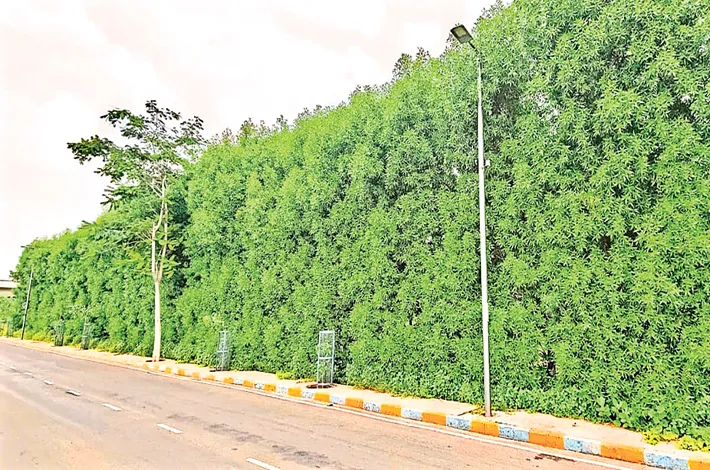Scientists bat for Conocarpus
16-04-2025 12:00:00 AM

- C.H. Mohan Rao, former director of CCMB says does not harm humans
- UoH study states tree has ability to capture carbon dioxide from the atmosphere
Does Conocarpus tree really harm humans? Environmentalists have been divided on the issue. So much so that several state governments banned the planting of the tree earlier this year. In the previous assembly session held in March, the Speaker Gaddam Prasad Kumar voiced concerns regarding the large-scale plantation of Conocarpus plants and urged the State government to take corrective measures by removing these plants from villages and roadsides across Telangana. But allaying all fears that the tree’s potential health risks, particularly its pollen triggers allergies, asthma and common cold were untrue said a group of scientists and environmentalists here on Tuesday.
Members of the Jana Chaitanya Vedika said that Conocarpus reduces air pollution contrary to popular belief. "We must act based on science, not speculation," said Prof. A.R. Reddy, emeritus professor at the University of Hyderabad. Prof. Reddy pointed out that every tree has its own ecological value, and Conocarpus, in particular, is a fast-growing, climate-resilient species that plays a key role in absorbing carbon dioxide (CO₂) from the atmosphere—a critical need in today’s fight against climate change.
C.H. Mohan Rao, former director of the Centre for Cellular and Molecular Biology (CCMB) said, “Feeding its leaves to dairy goats has led to better milk production and improved health in animals. It lowered levels of saturated fats, cholesterol, and blood urea nitrogen, while also enhancing antioxidant activity and reducing gut bacteria.
Rao warned against the unnecessary felling of such useful trees. “Cutting down more trees in these conditions will only make the earth more vulnerable. Instead, they can be relocated to areas like highways and open public spaces where they can absorb large amounts of CO2” he said.
Despite its many advantages, Conocarpus has drawn criticism in some cities where it was planted without proper planning. Prof. Reddy clarified that the issues are not due to the tree itself, but rather poor site selection. Planting trees in unsuitable environments leads to problems and confusion about their actual impact.
The growing imbalance in Earth’s CO2evels is alarming. Annually, around 9 billion tons of CO2 are released—mostly from fossil fuels—while only 4 billion tons are absorbed by oceans and vegetation. This leaves 5 billion tons lingering in the atmosphere each year, speeding up climate change.
The experts concluded that strengthening natural carbon sinks like trees is vital, and Conocarpus trees can play a key role in this effort.
States that banned its plantation
- January 2025: T.N. govt. to stop planting exotic Conocarpus trees
- January 2024: Gujarat bans exotic Conocarpus tree amid health and environment hazard
- July: 2024: 4,602 Conocarpus trees to be felled citing health hazards in Kakinada smart city
Tree has impressive ability to capture carbon dioxide from the atmosphere: UoH study
- BRS govt planted 273 crore saplings under the Telangana ku Haritha with an investment of ₹10,822 crore
- Nurseries and village forests were established across all villages, contributing to a 7 percent increase in Telangana’s green cover
Researchers at the University of Hyderabad have conducted an in-depth study confirming the environmental benefits of Conocarpus erectus. Their findings, published in ‘Plant Physiology Reports’ in January 2023, highlight the tree's impressive ability to capture carbon dioxide from the atmosphere.
Using specialized setups called Open Top Chambers (OTCs), scientists recreated current CO2 levels (400 µmol mol-¹) and higher future levels (550 µmol
mol-¹) to understand how these trees would respond in changing climate conditions. The results were striking—under increased CO2 levels, the trees grew 70% larger, meaning their stems, leaves, and roots expanded significantly.
Even more importantly, the study revealed that each Conocarpus tree stored 33.73 kilograms of CO2 over six months when exposed to higher CO2 levels, compared to just 12.89 kilograms under current conditions. This demonstrates the tree’s enhanced ability to absorb harmful greenhouse gases, making it a valuable asset in efforts to combat climate change.








